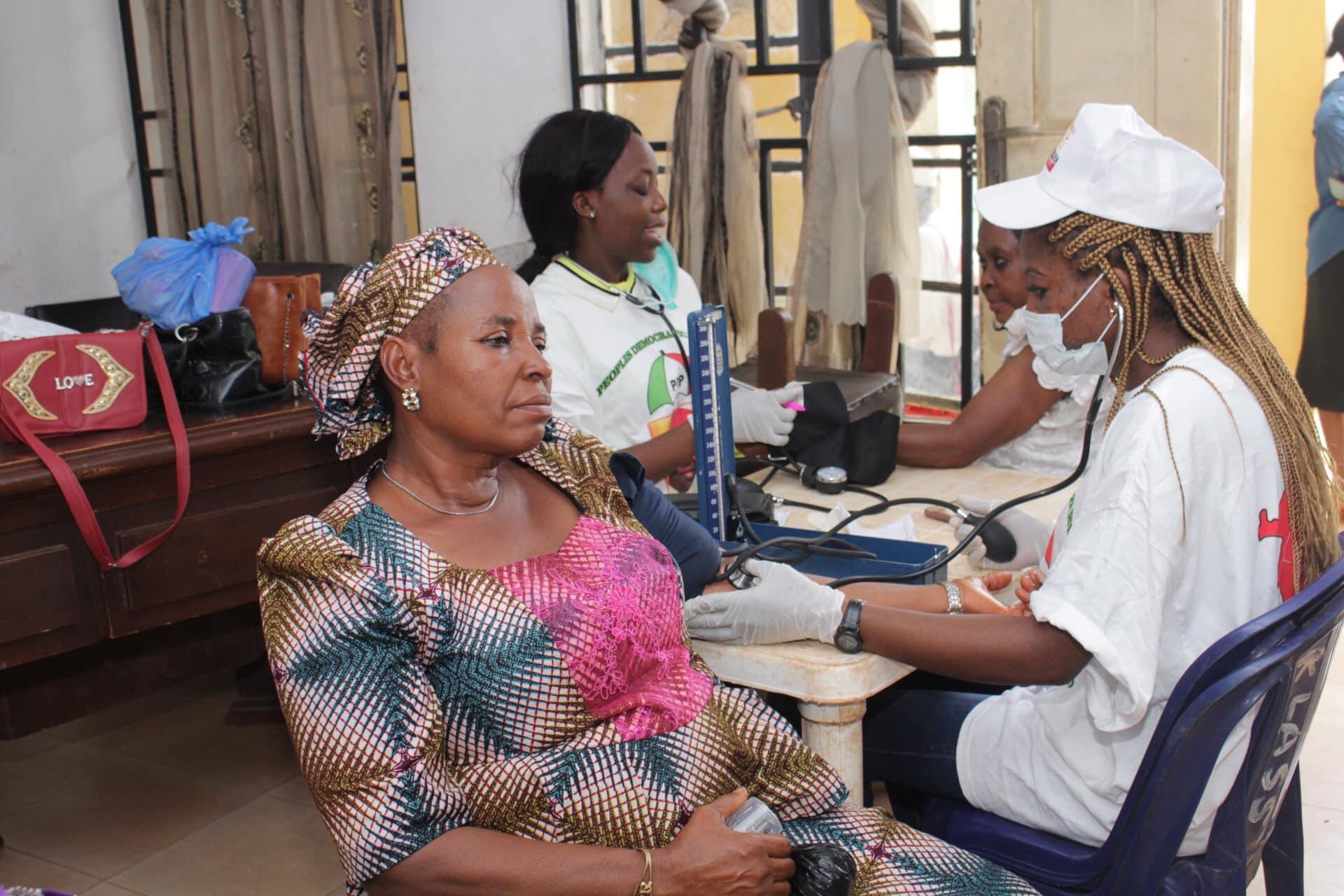“This article was produced in collaboration with Maternal Figures, a database of maternal health interventions implemented in Nigeria.”
At Amorji Nike Primary Healthcare Centre [PHC] in Enugu East local government council, more than a dozen women with their children wrapped in their arms sit patiently in a waiting room at the premises. The women came from different communities around the council to carry out routine tests and receive recommended drugs for free.
The situation is the same in other communities across the 17 local government councils of the state where health centres offering free services are located. Women regularly visit the PHCs during antenatal, delivery or routine medical checkups. These clinics provide comprehensive maternity services and treat difficult childhood illnesses while cases that the PHCs cannot handle, are referred to the state teaching hospital.
“Whenever my child is sick, this is where I bring him for medical care,” Nnedi Okafor, one of the women at the clinic says. “We don’t pay for anything here,” she adds. “When I gave birth to my first child, this was where they brought me and after that, apart from what we bought before coming here, I didn’t pay for anything.”
In 2007, the administration of Governor Sullivan Chime adopted the Free Maternal and Child Healthcare Programme (FMCHP), as a way of reducing maternal and child mortality. This programme removed user fees at the point of service delivery for pregnant women and under-five children based on a minimum services package.
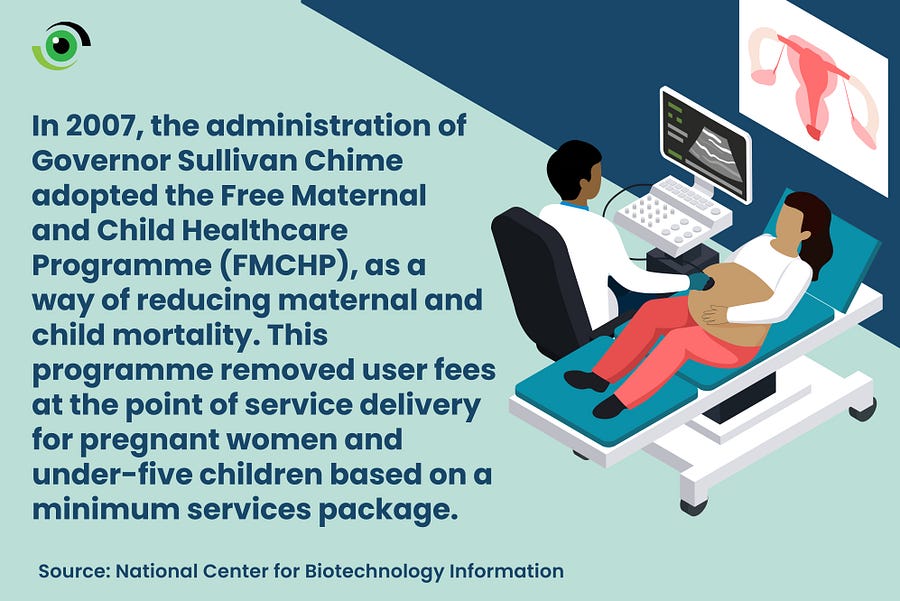
“The idea is that secondary and primary healthcare facilities provide services for free,” said George Ugwu, the executive secretary of the Enugu State Primary Health Care Development Agency, the agency that administers the FMCHP.
“In Enugu state, the number of women that register for antenatal care is very high (compared to others) in the country and our record of the number of women that delivered under the care of skilled birth attendants is also high,” he said.
According to data from the National Primary Healthcare Development Agency [NPHCDA] in the Reproductive, Maternal Newborn and Child Health Lots Quality Assurance Survey, of all the 36 states sampled in 2019, Enugu state was rated best in the proportion of sampled women that attended antenatal clinics during pregnancy. Also, the data showed that the state was in third place in the survey of women that attended four or more antenatal care clinics.
Collaborative funding from all tiers of state government
The free maternal health programme in the state has been commended by WHO, is funded by state and local government contributions and is delivered mainly through public primary and secondary health facilities. In May 2018, Governor Ifeanyi Ugwuanyi approved counterpart funding of N8.5 million monthly to augment the contributions of the 17 local councils who jointly contribute a total of N8.5 million monthly, for a total funding basket of N17 million.
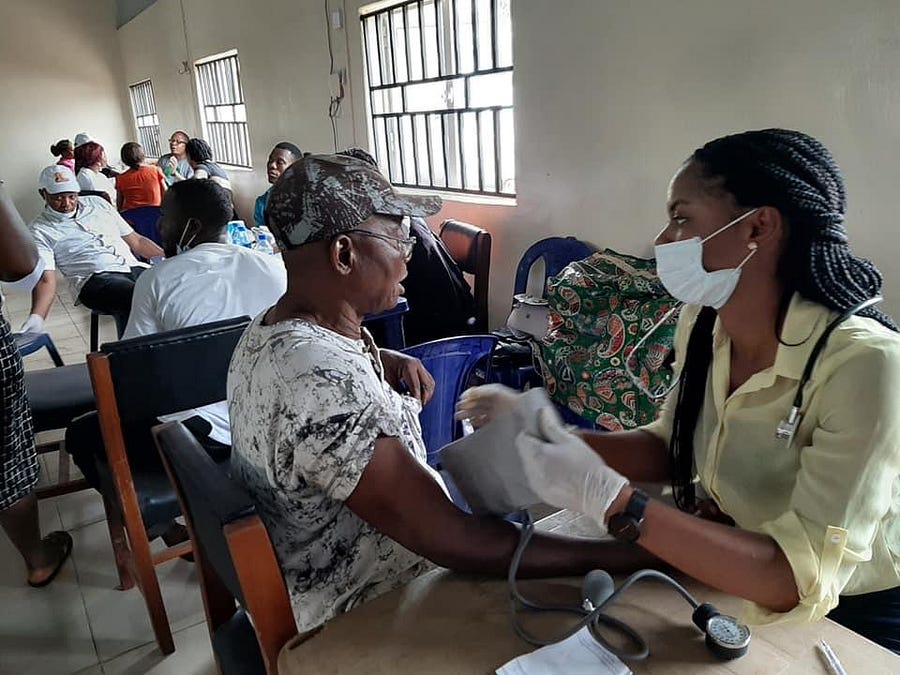
While some health facilities are in bad shape with infrastructural deficits, the state government has stepped up and embarked on renovating and upgrading community clinics to provide efficient services. One of such instances is Poly Clinic, which was equipped and upgraded to a hospital.
Enroute to meeting SDG 3
The free maternal health programme in the state is in line with the United Nations Sustainable Development Goals [SDGs] 3 which aims to ensure healthy lives and promote well-being at all ages. An estimated 303,000 women mostly from low-and middle-income countries around the world died due to complications of pregnancy and childbirth in 2015.
“Access and utilisation of health services has improved in Enugu state over the last decade following the free maternal programme despite seeming challenges in the health sector,” Ugwu says. “The programme has seen an increase in health access especially at the rural areas in the state.”
Ugwu adds that “Delivery with skilled birth attendants is one of the interventions that limit maternal death during delivery. So our maternal and newborn child health indices are on the good side. In fact, we are one of the best in the country.”
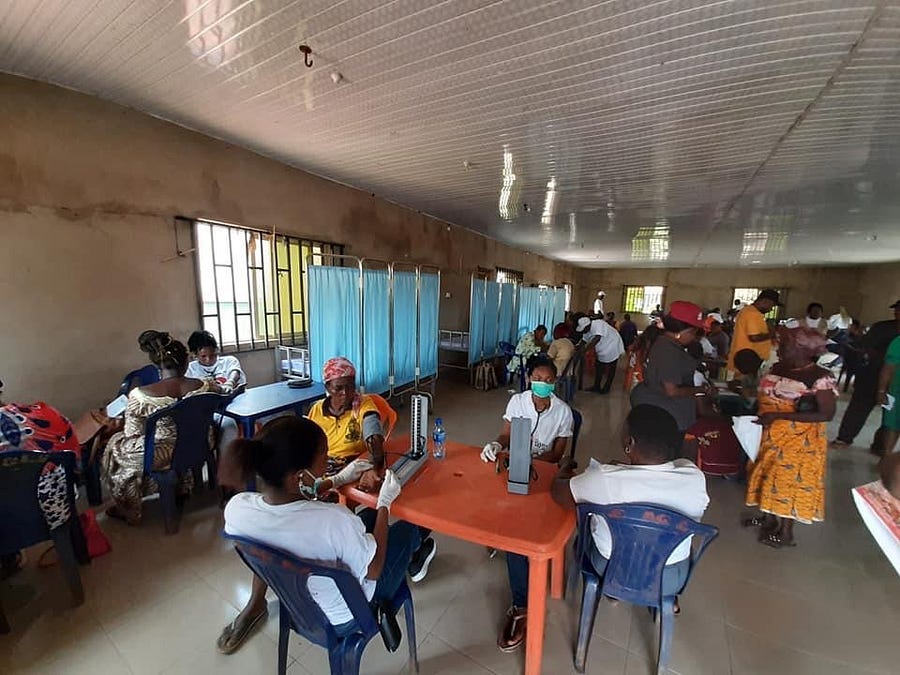
For the women at the rural areas who mostly access these health facilities and free maternal programmes, it has been a huge relief for them given that now they no longer have to worry about the financial burden that comes with utilising private health services.
“Visits to traditional birth attendants which often result in the death of mothers during delivery has significantly reduced over the years”, Ugwu noted. “Pregnant mothers will have access to these health centres for qualitative and affordable care whenever the need arises.”
A 2008 study on the impact of free maternal and child healthcare programme in the state found that it has led to increased antenatal booking and hospital delivery and has also decreased maternal and perinatal mortality rates in the state by 16.4 and 34 percentage points respectively.
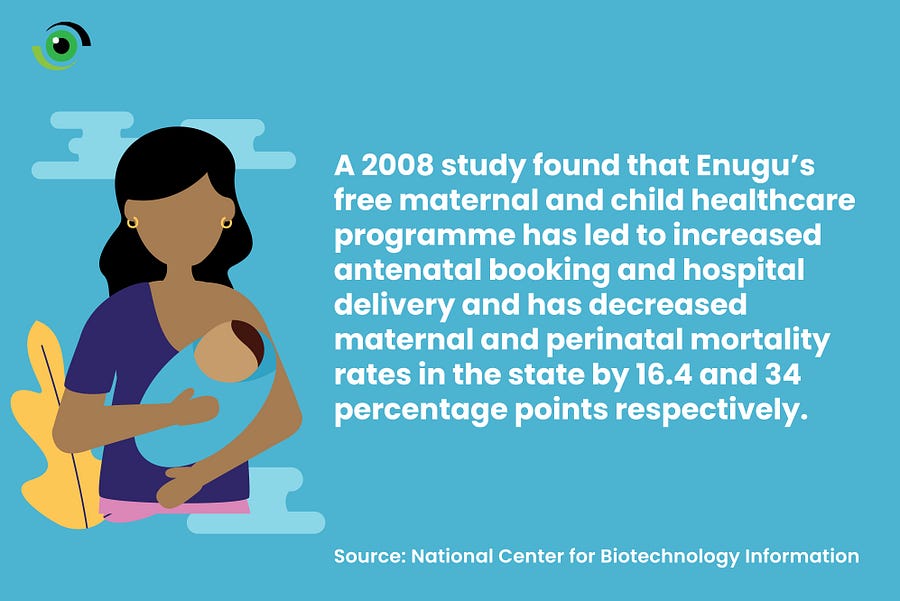
Funding a key challenge to maternal health programmes
While the free maternal health programme in the state has largely been successful, some challenges such as poor quality of health service delivery and low doctor to patients ratio still exist.
“Funding is a challenge affecting the success of the programme in the state,” Edwin Okechukwu, Enugu State Director of Primary Healthcare Development Agency, said, adding, “Funding is not steady and this derails some activities. Also, we don’t have enough health workers at some of these PHCs. For example, some PHCs have only two or three health workers and this affects delivery.”
Okechukwu added that some of the health workers at the PHCs have retired while some have passed away and there has not been recruitment for their replacement to fill the gap.
While maintaining that some challenges such as low doctor to patients ratio, irregular power supply, and non-conducive working environments exist, Ngozi Adonu, a nurse at one of the PHCs in Udenu local government council, a two-hour drive from the capital city, said the programme has improved over the years.
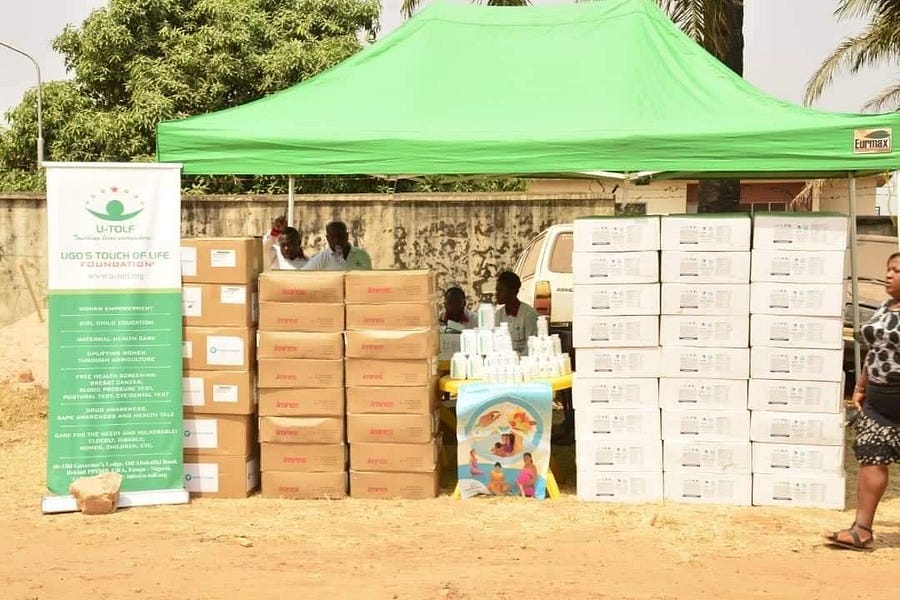
“We used to run out of supplies like antibiotics but we now receive them when we make such requests because women often come here for routine medical services,” Adonu, who has been working at the clinic for three years, said. “But you know the environment and the level of medical personnel you have also contribute to the success of any health programme like this one which works mainly at the rural areas,” she added.
Ugwu says improved access to healthcare services for women and newborns is reducing maternal and child mortality in the state. The most recent National Demographic and Health Survey [NDHS], published in 2018, showed that 93 percent of the women sampled in the state were delivered by Skilled Birth Attendants [SBAs] while 94.7 percent of them attended antenatal clinics at least four times during pregnancy. This is above the Southeast averages of 85.2 and 89.2 percent for SBA and antenatal clinic respectively.
“We would have been paying a lot if we had gone to state or private hospitals,” Okafor says, adding that she hopes the free maternal health programme in the state continues.
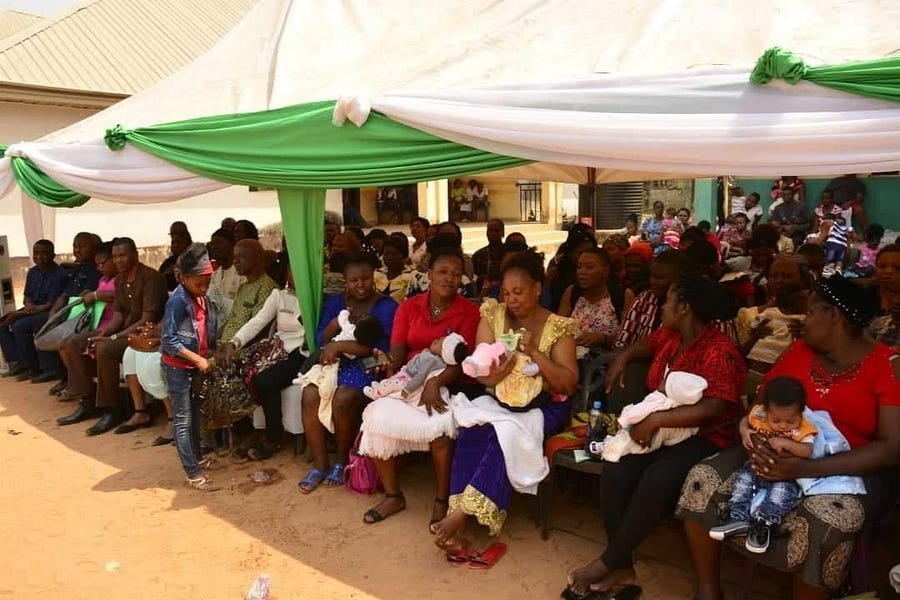
Ugwu says the programme is still going on across the state amidst the COVID-19 pandemic and the agency is working to sustain all maternal health services. Additionally, personal protective equipment have been distributed to the PHCs as 1875 workers have also been trained on how to respond to the pandemic.
“Poor attitude of citizens in complying with coronavirus preventive measures has been a challenge,” he adds.
Despite the success of the programme, Ugwu says it is still a work in progress. “The programme is functioning better than when it was established. We are trying to make sure that it is reaching those who need it and it is one of the finest policies that the government has for the poor and vulnerable,” he said.
“This article was produced in collaboration with Maternal Figures, a database of maternal health interventions implemented in Nigeria.”
Have you heard of other state health programs for maternal health that have been effective? Let us know in the comments below or on our social media platforms, @nighealthwatch on Twitter or @nigeriahealthwatch on Facebook and Instagram.


